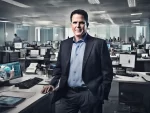Michael Dell is a multibillionaire American businessman, investor, and philanthropist who was born on February 23, 1965. He is the company's founder, chairman, and CEO. Dell Technologies is one of the biggest global providers of technological infrastructure. With a net worth of $70 billion as of September 2023, he is now the 16th richest person in the world, according to the Bloomberg Billionaires Index.
With 243.35 million shares of Dell stock valued at $3.5 billion in 2011, he owned 12% of the business. His estimated $10 billion in leftover money is handled by DFO Management, which also happens to be his initials, and is invested in various businesses. His offer to take Dell Inc. private for $24.4 billion, the largest management buyout since the Great Recession, was made public in January 2013. In October 2013, Dell Inc. formally became a private company. In December 2018, the business went public once more.
Early Life & Education
Dell was born to a Jewish household in Houston in 1965. His parents were Alexander Dell, an orthodontist, and Lorraine Charlotte (née Langfan), a stockbroker. Michael went at Houston's Herod Elementary School. He eventually enrolled in Memorial High School. He applied to take a high school equivalency exam when he was eight years old in an effort to start his career early. Early in his adolescence, he bought equities and precious metals using the money he earned from part-time work. At the age of seven, Dell bought his first calculator, and in his junior year of high school, he used a teletype machine. He obtained his first computer, an Apple II, at the age of 15, after experimenting with computers at Radio Shack. He immediately disassembled the machine to see how it operated. Dell worked the summers selling Houston Post subscriptions while attending Memorial High School in Houston. Dell enrolled in pre-med at the University of Texas in 1983 because his parents wanted him to become a doctor and he did so to appease them. Dell kept becoming better at focusing on particular demographics while soliciting newspaper subscriptions as opposed to merely conducting cold calls. He noticed that newlyweds and persons moving into new homes were the groups most inclined to purchase a subscription. He issued direct mail campaigns and made $18,000 in a single year after gathering the contact details of this population from public sources. At the age of 19, Dell left the University of Texas after hiring a number of staff members and making a gross profit of about $200,000.
Business Life
In Room 2713 of the Dobie Centre residential complex, Dell launched a side company making and selling upgrade kits for personal computers as a first-year pre-med student at the University of Texas. Then, since he didn't have the overhead of a computer business, he applied for a vendor licence to bid on contracts for the State of Texas.
Dell thought that a manufacturer selling PCs directly had significant financial benefits over the traditional indirect retail channel. Dell registered the business as "PC's Limited" in January 1984. Dell used a direct-to-consumer sales method, only producing computers after receiving an order. The company, which operated out of a condominium, supplied PC upgrades, kits, and supplemental parts for between $50,000 and $80,000. Dell moved to a business centre in North Austin and established the firm as "Dell Computer Corporation" in May. As Dell recalled, the firm employed a small number of order takers, a smaller number of order fillers, and "three guys with screwdrivers sitting at six-foot tables" as its production team. The venture required $1,000 in capitalization. At the age of 27, he was named the youngest CEO of a business included in Fortune magazine's top 500 firms in 1992. In 1996, the same year his business introduced its first servers, Dell began selling PCs online. Soon, Dell Inc. announced that dell.com sales averaged $1 million each day. In the first quarter of 2001, Dell Inc. surpassed Compaq to take the top spot among PC manufacturers with a global market share of 12.8%. Over the preceding seven years, the ranks had not changed until the introduction of the measure. While sales of rival companies were declining, the company's total shipments of desktops, laptops, and servers increased 34.3 percent globally and 30.7 percent domestically.
Dell established MSD Capital L.P. in 1998 to oversee the interests of his family. Real estate, private equity, and publicly traded securities are all examples of investment activity. The company has 80 employees and offices in London, Santa Monica, and New York. Daily activities are not handled by Dell personally. On March 4, 2004, Kevin Rollins, who had previously served as president and COO, was named president and CEO of Dell Inc. Dell resigned as CEO but continued to serve as board chairman. At the board's request, Dell took over as CEO on January 31, 2007, replacing Rollins.
Dell, Inc. was taken private in 2013 by Michael Dell with the aid of Silver Lake Partners, Microsoft, and a group of lenders. According to reports, the $25 billion deal had problems getting done. Carl Icahn provided notable opposition, but after a while he resigned. Michael Dell was given a 75% ownership share in the business. Dell Inc. declared its intention to buy the corporate software and storage firm EMC Corporation on October 12, 2015. It has been dubbed the "highest-valued tech acquisition in history" at $67 billion. The purchase was completed on September 7, 2016.

